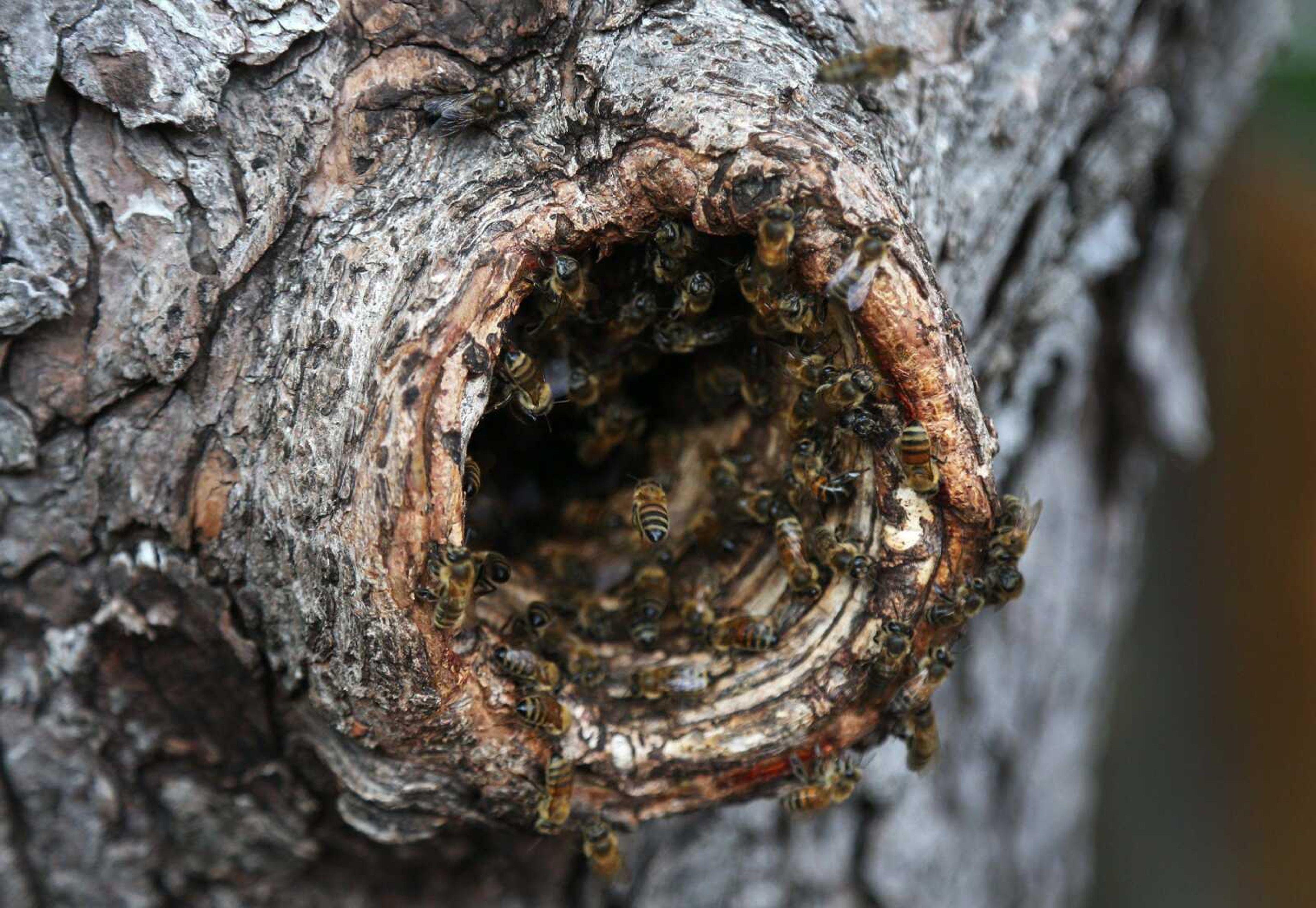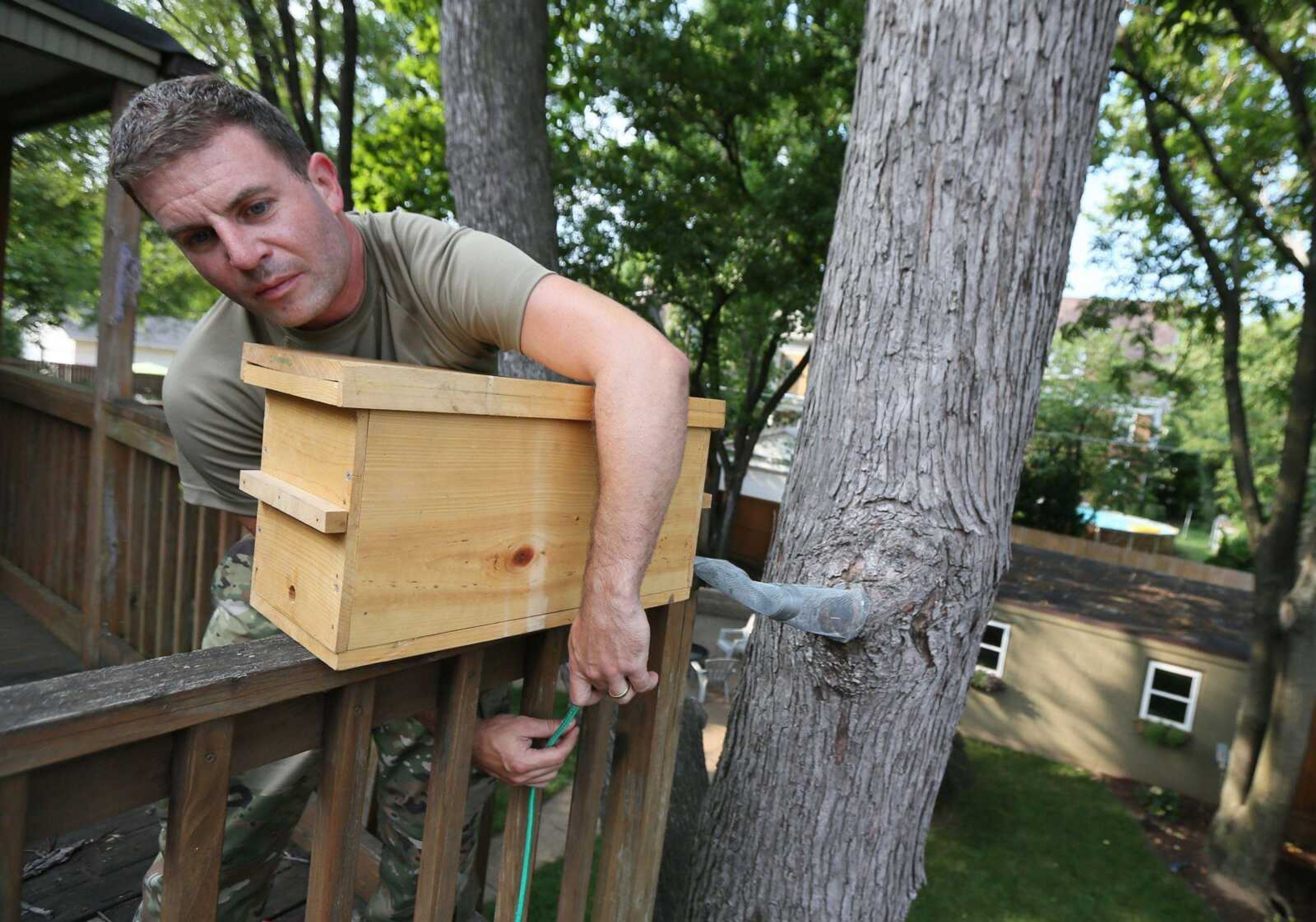Buzz worthy: City in St. Louis suburbs discuss adding new rules for beehives
BALLWIN, Mo. -- City leaders here are discussing new rules on hives that have some beekeepers buzzing. Citing a recent complaint, the rules are in a proposed ordinance that "recognizes the importance of bees as pollinators for the preservation of the ecosystem, but seeks to regulate the safekeeping of bees for the comfort and safety of all citizens."...
BALLWIN, Mo. -- City leaders here are discussing new rules on hives that have some beekeepers buzzing.
Citing a recent complaint, the rules are in a proposed ordinance that "recognizes the importance of bees as pollinators for the preservation of the ecosystem, but seeks to regulate the safekeeping of bees for the comfort and safety of all citizens."
Among the rules would be restrictions on the types of hives allowed and their placement on residents' lots.
Patrick Brookman, who has been tending to hives in Ballwin for the last 20 years, said he never has received a complaint and believes the city shouldn't crack down on beekeepers over one disgruntled resident.
He and others see parts of the measure as overly restrictive and even unworkable.

For example, Brookman said he believes it is futile to try to control bee swarms, a stipulation of the proposed law. He said swarms help bee populations, already struggling to survive, reproduce elsewhere.
Beekeepers question how the city would enforce such a rule when bees can travel on average of three miles from their hive to forage.
But beekeepers agree some of the proposed rules, such as providing law enforcement with a contact list with the name, address and phone numbers of beekeepers in case of emergency, are good ideas.
The Board of Aldermen took recommendations from local beekeepers but no action earlier this month.
Ballwin isn't the only local city where officials have set regulations on beekeepers or considered them.
The board modeled the language of its bill after a Webster Groves, Missouri, ordinance that covers "domestic animals and fowl."
Residents are required to apply for a permit to have bees, just as they are for other animals such as potbelly pigs, chickens and ducks. They are allowed up to five colonies.
St. Charles also has limits, including that one parcel of land can't have more than five honeybee hives.
In St. Louis, residents can have up to six hives. Violators can face fines.
Professional beekeeper and hive remover Jeremy Idleman has concerns not only about Ballwin's proposal to regulate parts of his business but about its use of pesticides that affect his insects.
He said pest control used in Ballwin for mosquitoes destroyed a bee colony newly installed on his property.
Idleman, "chief bee" at the St. Louis company Bee Found, has six hives in Ballwin, two at his home and six on a site in St. Louis.
Ballwin public works has agreed to stop spraying the chemical near beekeepers' homes if they have their addresses placed on a list.
So far, five people have requested their homes not be sprayed.
But the spraying wouldn't stop entirely. Jim Link, of the city's public-works department, said workers would avoid the area until later at night when bees are less likely to be outside the hive. The team usually sprays from 8 p.m. to midnight, he said.
Idleman has recommended the city try a nontoxic solution called Mosquito Barrier, a mix of garlic oil and other ingredients, as an alternative that wouldn't harm bees.
He isn't the only local beekeeper worried about what officials are using to control other insects.
In Fenton, Missouri, beekeepers who said they are experiencing die-offs have sought answers from the county on why their colonies are suffering.
In recent years, honeybee loss has been cited as a growing concern around the globe. The potential causes cited include pesticides and global warming.
In Missouri, some bumblebee populations also are declining, while others thrive.
Nicole Miller-Struttmann, Webster University biology professor, is one of the organizers behind St. Louis BeeBlitz, a project in which people take pictures of bees to help researchers track bee populations and determine which bee types are thriving.
There are more than 450 species of bees in Missouri and about 170 types in the St. Louis region, exhibiting a level of wildlife diversity some may not expect in an urban environment, Miller- Struttmann said.
But ordinances seeking to monitor beekeepers and their hives might be misdirected energy, she said.
A more beneficial use of time could be "modifying our thinking on how we use our land," Miller-Struttmann said.
Creating an "insect-friendly" environment for native bees in and around St. Louis means fewer pesticides and sowing native plants.
Eastern Missouri Beekeepers Association president Robert Sears said healthy honeybee colonies benefit wildlife, contribute to food production and enrich urban environments.
When bees are jeopardized by the spread of disease, pesticides and the loss of diverse plants, ecosystems suffer. Sears said people interested in helping honeybees can plant flowers on their property to foster friendly habitats for bees and other pollinators.
Sears sees some local attempts to regulate beekeeping as unnecessarily restrictive.
He said in some cases, complaints could be handled with a nuisance law rather than "cumbersome and rigid ordinances."
He questions whether proposed rules aimed at regulating bees might be unconstitutional under the state's Right to Farm amendment.
Despite the worries about hive losses, Idleman sees a bright future for his beekeeping business. He is planning a venture called Wings for Warriors. It would involve giving veterans with post-traumatic stress disorder a free hive and a 15-month mentorship.
"I had it (PTSD) when I came back from Iraq, and I soon learned that beekeeping is a relaxing, but challenging, hobby that helps to take my mind off of things," he said. "I want to help others to give that."
Connect with the Southeast Missourian Newsroom:
For corrections to this story or other insights for the editor, click here. To submit a letter to the editor, click here. To learn about the Southeast Missourian’s AI Policy, click here.









